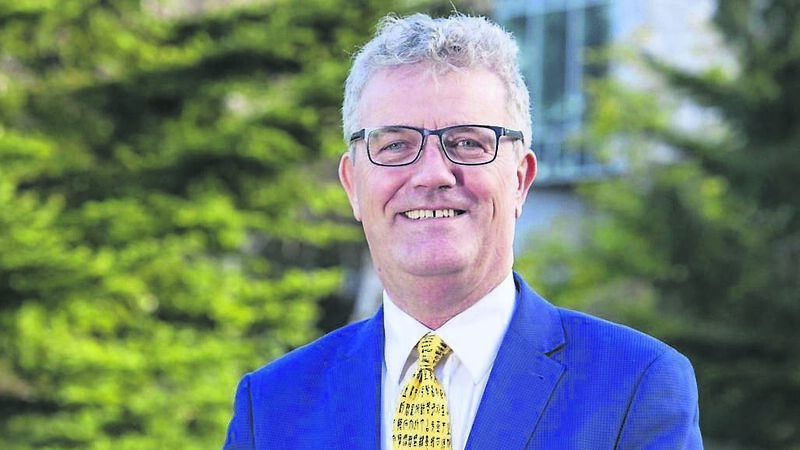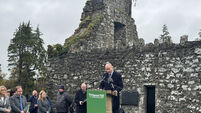UCC President: Cost of living should not be a barrier to education

THE rising demand for, and the cost of, accommodation for both students and staff at University College Cork is the most significant challenge facing the third-level institution, UCC president John O’Halloran has said. Pic Diane Cusack
THE rising demand for, and the cost of, accommodation for both students and staff at University College Cork is the most significant challenge facing the third-level institution, UCC president John O’Halloran has said,
He declared that the university is prepared to work with the Government and other bodies to increase the availability of affordable accommodation.
Professor O’Halloran told The Echo that while the university provides 1,536 beds in campus accommodation — which he said were the most affordable purpose-built student accommodation in the city — more was needed as a matter of urgency.
That is illustrated by the latest figure for the UCC student population of 22,000. Add to that the enrolment at Munster Technological University and other third-level institutions in the city and the scale of the need is evident.
“UCC is acutely aware of how difficult it is for our community — students and staff — to find accommodation in the current market,” said Professor O’Halloran, who also outlined some of the additional supports offered by the university to those seeking accommodation.
“UCC offer a dedicated accommodation advisory service through the Accommodation & Community Life team.
“This team supports students in finding safe and affordable accommodation tailored to their needs. This team also manages UCC Student Pad, an accommodation search engine that connects students with local landlords offering private rentals and owner-occupied housing.
“Despite all this, more affordable accommodation is urgently needed and we are committed to working with the Government and other bodies to increase affordable accommodation.”
While independent providers have built and acquired purpose-built student accommodation, the cost of this accommodation can be daunting — rent of €350 per week is not unheard of.
One provider, Novel BottleWorks, which is based near Victoria Cross, across from the Kingsley Hotel, charges up to €450 per week for an en-suite bedroom/bathroom.
The same company offers full board for €900 per month in its student accommodation in Pamplona in Spain.
This is a challenge for UCC as it has to compete with other universities in Ireland and across Europe to attract students to come and study in Cork, and the increasing cost of living is making it more challenging.
Another challenge UCC faces is the funding shortfall it has confronted in previous years which saw it report an €8m deficit for 2023. This past year has seen a massive turnaround in those fortunes as it recently declared a draft surplus of €7m for 2024.
Staff were told at a town hall-style meeting that the university’s income had grown by 14% since the covid pandemic but that its costs had risen by 17%, and that if it was not addressed, the deficit could spiral to over €20m.
A surge in inflation, interest rate rises, losses on investment funds, and, crucially, structural funding deficits in pay awards, research overheads, and capital funding, were also to blame.
Under cost-cutting measures, entitled Project Alpha, all discretionary expenditure was scrutinised and only essential expenditure was approved.
Spending on new mobile phones or contracts, on IT, stationery, and furniture was paused, and a revised policy on travel and expenses was developed. One of the issues which has complicated the financial situation for UCC and other universities is the practice by Government to announce what supplementary grants will be available to pay for the public pay awards they negotiated in December, three months after the financial year ends.
The core funding for 2025 will only be announced later this spring, leaving UCC and other institutions uncertain whether they will have the funding to meet the cost of the pay increases, estimated to be around €7m for UCC.
Last September, UCC governing body chairman Sean O’Driscoll expressed sharp criticism of the funding model for UCC and other universities and third-level institutions which he described as ‘not best practice’ and ‘short term’.
He called on the Government to create a multi-annual funding model which would allow UCC to plan for the future with more certainty.
Speaking to The Echo, Professor O’Halloran had this to say about Government funding: “UCC had a clear message this year on the need for increased funding for the sector.
“We hope the new Government will maintain that momentum and fully bridge the gap in funding identified by the Funding The Future report.”
In Budget 2025, announced last October, the Minister for Further and Higher Education, Patrick O’Donovan announced an increase of €150m in core funding for the third-level sector. The rider to this was that it would be achieved by 2030. So the uncertainty remains.
The good news for UCC came near the end of 2024 when it announced in early December that it generates approximately €1.18bn per year for the Irish economy.
“We also recently launched our Economic and Societal Impact report, which shows that UCC generates €6 for every €1 of State investment,” said Professor O’Halloran.
“We believe we can grow that further if we tap into those potential partnerships with the industries on our doorstep.
“UCC leads Ireland in industry engagement, securing over €120m in research funding in 2023.
“But we believe we can do more. We recently launched a business engagement website which is a one-stop-shop for businesses from SMEs to multi-nationals looking to work with us.”
In terms of employment, UCC is Cork’s third largest employer, employing almost one in 13 of every worker in Cork city and county.
The work to advance UCC continues in the face of these challenges. Professor O’Halloran told The Echo that, while it was always assessing its positioning and brand nationally and globally, it had no plans to change its name in the manner of University of Galway, which had changed its name from the National University of Galway.
More in this section







 App?
App?


